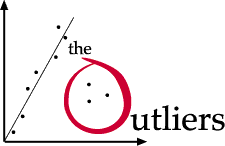“Everything we have learnt in Outliers says that success follows a predictable course. It is not the brightest who succeed. If it were, Chris Langan would be up there with Einstein. Nor is success simply the sum of the decisions and effort we make on our own behalf. It is, rather, a gift. Outliers are those who have been given opportunities- and who have had the strength and presence of mind to seize them.”
Malcolm Gladwell’s Outliers, Chapter 9 pg 267
I think it’s fair to make the assumption that everyone wants to be successful. No matter what field or area we choose to pursue, we want to be good at what we do and most importantly, our fallen nature wants to be recognised for the good that we do. Outliers, is not a self-help book, neither is it a quick read promising to make you successful. It is a book of discovery with one simple aim: To ask the question, what is it that makes people so successful?
For those who like to fully submerge themselves in science and believe that it has the answer for everything- then this book probably won’t meet you where you’re at. Gladwell, does not uncover the secrets of success being the discovery of a secret gene, tucked away in DNA, that only some possess. Neither does he confirm that success is confined for only the brightest students, rather, it is all a matter of opportunities and what we do with them. Think back to Neo in the Matrix, where he can either take the red pill or the blue pill. It is not as life threating as that clip- but Malcolm Gladwell has unveiled that makes people so successful in their chosen fields is a combination of the basis of their work ethos, how prepared they were (10,000 hour rule) and fundamentally what they did with the opportunities- good or bad- that arose before them.
With a fine tooth comb, Gladwell,goes through well known individuals in our society whom no-one would dispute as being successful. Ranging from Bill Gates, to The Beatles and even lesser known success stories such as Chris Langan ( dubbed the world’s smartest man) and even delving into aviation and how cultural characteristics can (and have) determined the safety of it’s passengers,crew members and airline credibility.
Initially, I felt that I was reading a friends’ thesis- Gladwell, I feel to some extent enjoys making you feel like you’re about to divulge into a novel, which each chapter having a descriptive beginning- but when he get’s into the swing of things you as a reader become more intrigued with where he’s taking this idea of Outliers. As, towards the end of the introduction, I began to get a little more curious as to how any person deemed as an outlier would almost be pre-destined for success.

In no, way am I planning to spoil this book for those who are yet to read it, yet, I feel that what Malcolm Gladwell has done is unpeel the belief that success is all about a numerous string of lucky breaks. Throughout the nine chapters, Gladwell disintegrates the notion that success in highlighted areas such as maths, aviation, computers and music are just bound to certain ethnic or social groups. Rather he delves deep into the understanding as to why the American-Asian community are so good at Maths. Why The Beatles ended up becoming one of the most successful bands on the planet and more crucially- how a change in cultural thinking can revolutionise educational systems worldwide. (You have to read the book to understand but I can now see why educational programmes like Kumon Maths work- because of the Asian principles that act as its foundation.)
The book had left me taking steps back into my upbringing/ schooling and generally life’s opportunities and wondering if I seized them to the full capacity. Throughout the motions of the book, I believe that reading this book with the intention that it is going to make you successful is a bit of a farce. Nothing can make you successful, however there are opportunities available to all of us. They may not be the same but it’s what we ultimately do with these opportunities and whether or not we’ve put in our “10, 000 hours” that will define if we are successful or not.
I believe that hard work and dedication went into Malcolm Gladwells book and I don’t dispute what he had written down onto paper. Throughout the duration of me reading the book, I often paused to think about individual's I know who fall into the outliers category. They may not have millions in the bank but are rich through other means and are successful, that which cannot be denied. In our society, we believe that having money can buy you a fantastic education- but where we fail in our understanding is that it cannot buy you knowledge. There are many people out there who attended the best schools in the country, had all the opportunities' laid out in front of them, but failed to take them because they felt that they would always be available. In comparison to those who went to the local comprehensive, were not necessarily predicted A’s and A*’s but seized every opportunity available, whether it be staying after school to go through past papers or writing letters to those already in the position they once hoped to be and building a rapport that way. Success comes to those who want it, but you’ve got to want it bad enough and use what the world regards as disadvantages to your advantage.

No comments:
Post a Comment
I'd appreciate your thoughts... so write them down.